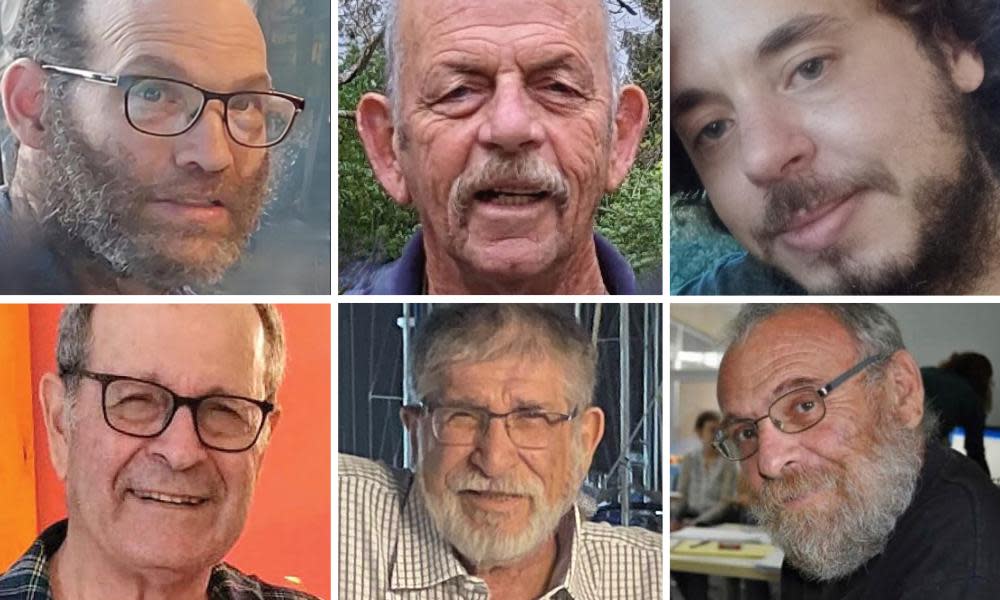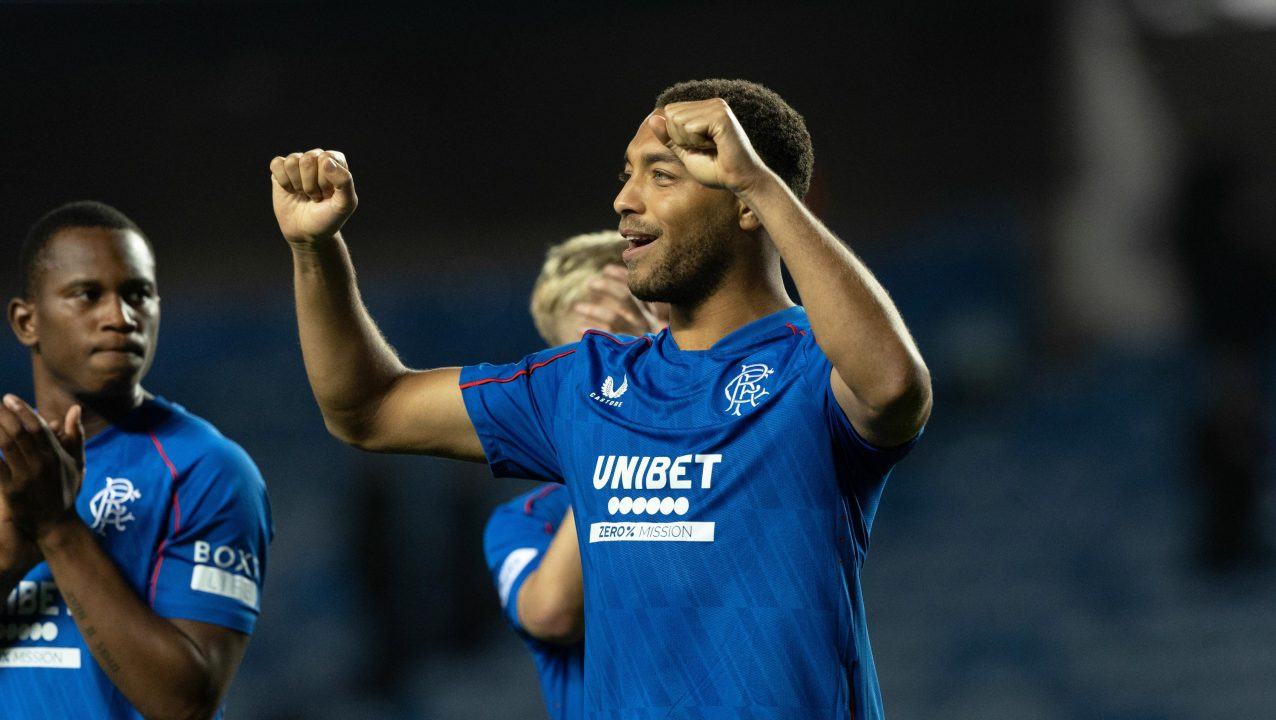Good morning. There were 115 Israeli hostages, dead and alive, left in Gaza; now there are 109. Yesterday, the Israel Defense Forces said that taken by Hamas on 7 October last year – Yagev Buchshtab, Alexander Dancyg, Avraham Munder, Yoram Metzger, Nadav Popplewell and Chaim Peri – from tunnels under the city of Khan Younis.
While the families of all six had already announced that their loved ones were believed dead, that physical confirmation was devastating all the same. Meanwhile, at least 12 Palestinians , Gaza’s civil defence agency said, adding that the building was being used to house displaced people. Israel claimed that it was a command and control centre for Hamas.

The count maintained by Gaza’s health authorities of dead Palestinians stands at more than 40,000. Before he held ceasefire negotiations in Egypt and Qatar yesterday, the US secretary of state, Antony Blinken, warned that the talks were “maybe the last opportunity” to broker a hostage and prisoner swap. In Israel, the sense that time is running out remains a central source of pressure for the deal that the hostages and Palestinian civilians so desperately need.
Today’s newsletter, with Tel Aviv-based political analyst and public opinion expert Dahlia Scheindlin, is about the weight of the hostages in Israeli discourse, and what it would take to bring them home. Here are the headlines. | , cut spending and get tough on benefits in October’s budget, amid Treasury alarm over the state of the public finances.
Changes could include rises in inheritance tax and capital gains tax, while Reeves may also reject pressure to remove the two-child benefit cap. | Amid chants of “Yes, she can!”, Barack Obama and said: “We are ready for a President Kamala Harris.” He was introduced by his wife Michelle, who said that Harris had sparked hope and alleviated “a palpable sense of dread about the future”.
| Six missing people after a yacht sank off the coast of Sicily. They are tech entrepreneur Mike Lynch and his teenage daughter Hannah; Morgan Stanley International chair Jonathan Bloomer and his wife, Judy; and lawyer Chris Morvillo and his wife, Neda. A body recovered on Monday was confirmed as that of the vessel’s chef, Recaldo Thomas.
| Scotland’s drug deaths , as ministers pledged to intensify efforts to deal with the problem after a “hugely concerning” 12% increase in fatalities last year. | The world’s oldest known person, Spain’s Maria Branyas Morera, who was born in 1907 and lived through two pandemics and two world wars, at the age of 117. Branyas got Covid-19 aged 113 in 2020 but made a full recovery and was said to be “completely lucid”.
Chaim Peri, one of the six hostages whose bodies have been recovered, was hiding in a safe room with his wife, Osnat, at their home in Nir Oz kibbutz when Hamas militants came to the door. Osnat by going with them before they entered the room where she was hidden. Yesterday’s news was “a devastating blow” to Israelis, said Dahlia Scheindlin.
“It brings a sense of overwhelming sadness – and a feeling of being in the dark. You almost feel you know less than you did before: how long where they dead for? How did they die? So the first response is despair.” After that comes disbelief at those who continue to argue that only war can save the hostages – and questions over whether Netanyahu or Hamas are serious about a deal.
Yesterday, Israeli opposition leader Yair Lapid emphasised the sense of urgency, saying: “Days are passing, and we are losing more hostages. We must make a deal. We must.
Now.” Here’s what you need to know about the mood in Israel, and how it could shape what happens next. *** Reliable majorities of Israelis support a deal to get the hostages out, and even when conditions that they may find uncomfortable are attached – like a complete cessation of hostilities – a plurality still prioritises the hostages, Scheindlin said.
(She wrote about the polling data in some detail .) “I’ve never seen anything that shows the reverse,” she said. “But the minority is not a small minority.
It’s usually between 30% and 38%, and that is just about the size of Netanyahu’s core constituency.” One argument from some Israeli liberals is that many of those who support a deal in theory are committed to an idea of the hostages as, , “the yearned-for common denominator that is held above politics”, but that “behind all the fake hostage folklore, there is no solidarity”. Scheindlin rejects that view.
“I don’t see it in the data,” she said. “People are clear about what a deal would entail. Certainly, sometimes they may not like it – but they are prepared for the trade-offs.
” *** While US officials have suggested that an agreement on a US “bridging proposal” is near, and that Netanyahu has accepted it, Hamas has accused Washington of caving to Israeli demands and says “it is a manoeuvre that gives the Israelis more time”. There appear to still be large gaps between the two sides. On the central issue of the hostages, Hamas is demanding assurances that Israel would not begin military operations again after a first tranche of 30 of the most vulnerable are released.
Israel is concerned that Hamas will drag out a second phase in which the remaining hostages, including male soldiers, are freed. That phased approach has drawn criticism of Netanyahu from those who believe that all of the hostages should be freed as quickly as possible. “He does seem to be dropping hints that this time he’s more willing to edge towards a deal,” Scheindlin said.
“There have been what appear to be managed leaks suggesting that the government will not fall if there is a deal, despite the opposition from the far right.” Hamas’s priorities are an opaque question on their own. “The ball does appear to be in their court,” Scheindlin said.
“They have to consider whether they want to be blamed for the next phase of the war, which could be Armageddon in Gaza. They may not have the same considerations as me, but it is a mistake to say they are not rational in their decision making.” *** Between a third and half of the hostages are believed to be dead; the condition of the rest is unknown.
Most are civilians; most are men, with women and children forming the bulk of the previous swap deal; some are elderly. Not all are being held by Hamas, with some under the control of other armed groups, but it is likely that Hamas would be able to secure release in the great majority of cases. While some have been held in apartment blocks – including the four who were freed during a June operation that killed at least 274 Palestinians according to Gaza’s health ministry – many are likely now in Hamas’s underground tunnel network.
That makes it hard to see how military operations alone can secure their freedom. There is limited information about recent conditions, but many of those released last year painted a grim picture. Doctors who treated members of that group described intense trauma, and children being sedated with ketamine or benzodiazepines.
There were multiple accounts of sexual abuse, and that women had been raped and subjected to sexualised torture. Israel’s health ministry said that the freed hostages had lost 17-33 pounds in the seven weeks of their captivity. As for the fate of those who remain: “There’s been a lot of conflicting information,” Scheindlin said.
“Some may have been killed by their individual captors; some died because conditions were so poor; some were killed by Israeli fire. And there may be some cases where Hamas is not sure about where they are.” She points to the case of Shiri Bibas and her sons Ariel, 4, and Kfir, 1.
“Hamas wanted to get rid of women and children in the first round – it is not good PR for them to still be captive. They may not know whether they’re alive or dead.” There have meanwhile been warnings that Palestinian detainees held by Israel have been tortured and sexually abused.
53 Palestinians have died in Israeli military facilities and prisons since 7 October, , with doctors, journalists and human rights defenders among the detained. from earlier this month has more detail on some of the cases. *** There are two main senses in which the clock is ticking, as Blinken suggests: because it is always possible that more hostages will die, a risk that only grows with time; and because the prospect of an Iranian attack after the recent killing of Hamas leader Ismail Haniyeh in Tehran if no deal is reached would likely reshape the conflict in seismic, unpredictable ways.
“It only gets harder,” Scheindlin said. “It is always the last chance for anyone who will not live to see another day, that’s obvious. And at the geopolitical level, I expect an Iranian response sooner rather than later.
If there’s a regional war, all bets are off – and the chaos will mean that there’s nobody to negotiate with. In that context, the idea that some grand military response is the way to get them out looks increasingly unhinged.” While Hamas obviously shoulders a great share of the responsibility, many of the hostages’ families are focused on Netanyahu.
Shahar Moz, whose uncle Avraham Munder was one of the six whose bodies have been found, told Haaretz the news “only underscores how critical the urgency and the necessity of releasing everyone who is there alive ...
Body retrievals don’t impress me. There are live people for whom Israel isn’t doing the maximum it can to rescue them.” The woman with a “Nans against Nazis” sign at an anti-racism protest in Liverpool (above) is just one of the ageing “ ” Sally Feldman champions celebrating the activism – and dismissing the stereotypes – of older women.
For Guardian US, to heterosexual couples about undergoing , and the mixed emotions that come with procedures such as vasectomies. ICYMI, a beautiful, evocative and chilling photo essay: for six years Pierpaolo Mittica went inside the exclusion zone to – and who have largely been evacuated after Russia’s invasion of Ukraine. A listening pick just to shake things up: the Guardian’s Science Weekly podcast is running some of its best episodes of the year over the summer.
In today’s instalment, of dutiful older siblings and rebellious babies of the family to ask whether really does have an impact on our personalities. What parent has not at some point asked, who this person living in my house? In (£), Joshua Rothman surveys the case for , asking: “What would a family look like if the fundamental separateness of children was taken for granted, even during the years when they depend on us the most?” | Jannik Sinner, the men’s world No 1 tennis player, after he argued that two failed anti-doping tests had been a result of contamination through his physiotherapist. An independent tribunal ruled that Sinner bore “no fault or negligence” for twice testing positive for trace amounts of the banned substance clostebol.
| Wolves Aaron Ramsdale from Arsenal and have submitted a loan proposal with an option to buy the goalkeeper next summer. They face competition however – Ajax had a loan bid rejected last week and Southampton and Bournemouth are among those to have expressed an interest. | As England’s Test series against Sri Lanka begins today, that stand-in captain Ollie Pope faces “a three-Test audition to be the long-term successor to Ben Stokes”.
While Stokes has told Pope to bring a personal touch, with the totemic all-rounder on the ground for all three matches, a big change in England’s approach is unlikely. The splashes on “Reeves plans tax rise amid alarm over ‘black hole’”, and the leads with “Reeves plans above-inflation rise in social rents to boost housebuilding”. The says “PM warned: empowering unions will stifle growth”.
The has “Probe into ‘hatches left open’ on doomed superyacht” while the says “Horror video shows yacht’s final moments”. The asks “Could anyone still be alive?” but in the it’s “Hopes fade for the missing six”. “Brits without new £7 EU visa face being turned away at airport in 2025” is the lead story in the .
“Sven: my goodbye” – the terminally ill former England boss says in a TV documentary that he has “lived a good life”, the tells us. According to government statistics, the UK has issued more than 100 arms export licences to Israel since the 7 October attack. “They have to get off the sidelines”.
So says Dewayne Martin, of the many young men in the US who are pro-choice but do not speak out about abortion rights. Martin is part of the organisation Men4Choice, which reaches out to the large number of men who support the right to legal abortion, but are unlikely to discuss the topic openly (65% of men between the ages of 18 and 29 said they supported legal terminations in all or most cases, in the aftermath of the supreme court’s decision to overturn Roe v Wade). Men4Choice , and to get these men to vote, canvass and act on their beliefs alongside women.
“When we think about our organising strategy, it’s: help men see the harm,” said co-founder Oren Jacobson. “Help men understand how this issue is not just a woman’s issue ..
. It is an issue that impacts all of us, our families, our loved ones.” And finally, the Guardian’s puzzles are here to keep you entertained throughout the day.
Until tomorrow..



















